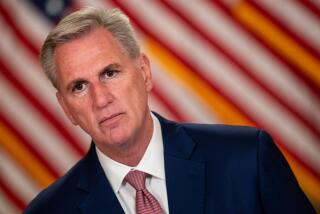Obama defines the opposition
- Share via
WASHINGTON — President Obama has tried to shape the nation’s view of what would happen if Congress failed to pass his economic stimulus plan, arguing that crisis could turn into catastrophe.
Now, as Obama looks not only to the recovery plan but to the tougher task of securing a second bailout for banks and other financial institutions, he is working harder to shape the public’s view of the Republicans who have formed a near-uniform wall of opposition in Congress.
Again and again in his prime-time news conference Monday, Obama painted his GOP adversaries as well beyond the mainstream. Some, he said, do not see any role at all for government in helping avoid an economic meltdown.
“In fact, there are several who have suggested that FDR was wrong to intervene back in the New Deal,” he said, referring to President Franklin Roosevelt, the hero of the Great Depression. “They’re fighting battles that I thought were resolved a pretty long time ago.”
At another point, he implied that his opponents wanted to stand by idly and watch the nation decline: “Do you just want government to do nothing, or do you want it to do something?”
Obama’s goal was not just to make sure the American public sticks with him, but to make sure that Republicans and independents who voted for him are reminded of why they took his side last November.
Amid a barrage of criticism from Republican lawmakers and conservative talk show hosts, the $800-billion-plus stimulus bill has become mildly less popular among Democrats and independents, polling shows. But it has seen a significant erosion of support among Republicans.
And while Obama can certainly pass the stimulus plan without most GOP lawmakers, he does not want to lose credibility in the eyes of moderates who helped him turn Republican red states to blue -- and whose continued support is needed to keep his approval ratings high.
A new survey by the Pew Research Center for the People and the Press shows that support for the plan among Republicans has dropped over the last three weeks to just 24%, down from 37% in early January. Overall, the poll found, support has dropped from 57% to a bare majority.
Obama’s overall job performance ratings remain impressive, but White House strategists know that a polarizing fight over the stimulus could dampen his popularity and sap political capital that he needs to push a bank bailout and other agenda items.
Obama is not only trying to shape public impressions of Republican leaders, but trying to reach into the GOP and reshape it as his ideal opponent.
In pitching his economic plan during a town hall Monday in Elkhart, Ind., he welcomed one questioner’s mention of Sean Hannity, the conservative lightning rod, saying he’d be open to having a beer with the talk show host. The effect was to elevate the Fox News personality in the public eye, and possibly to identify Obama’s Republican opponents with a hard-edged, conservative figure.
Several weeks ago, Obama mentioned Rush Limbaugh by name during a Capitol Hill meeting with Republican lawmakers, which drew the talk show host into a verbal spar that seemed to help both men. Limbaugh gleefully declared himself the leader of the Republican Party, giving the White House a convenient signal to mainstream voters that Obama’s chief opponents were represented by the bombastic and easily caricatured Limbaugh.
But even as he defines his opposition, Obama still tries to portray himself as bipartisan.
Obama’s aides made a carefully considered choice in picking the two destinations of this week’s road trips to promote the stimulus bill -- Indiana and Florida, both Republican-leaning states that turned Democratic in last year’s presidential election.
Obama is reminding voters, and lawmakers, in those states of the reasons they had turned away from the GOP.
His effort at repainting the GOP in the colors he chooses continues today. As Obama campaigns for the stimulus bill in Florida, Republican Gov. Charlie Crist will appear with the Democratic president at an event in the conservative Gulf Coast city of Fort Myers.
Crist said Monday he was happy to honor a White House request that he call Republican lawmakers and make additional appearances on Obama’s behalf, arguing that his hard-hit state needs stimulus money for schools and other programs.
“I think he’s doing the right thing,” said Crist. Referring to critics in his own party who might begrudge his helping a Democrat, he added: “I don’t really care.”
White House officials said Monday that they planned the trips to Indiana and Florida in order to show skeptical lawmakers that the country was yearning for help.
And most of the questions in Elkhart came from locals who spoke of lost jobs, troubled local businesses and an economy with little hope of recovery.
In the Senate on Monday, three moderate Republicans backed the stimulus plan as it survived a key procedural vote. That outcome showed that the White House probably has enough votes already to pass whatever compromise gets worked out in the coming days.
The challenge for Obama is to keep the public in his camp.
That is more than he was able to do Monday with one of his own presumptive lieutenants, Sen. Judd Gregg (R-N.H.).
Gregg, picked by Obama to lead the Commerce Department, a key post on his economic team, withheld his support for the president’s stimulus bill, choosing not to vote.
But that decision will likely prove harmless to Obama, whereas Gregg’s presence in the Democratic administration could prove helpful to the president’s efforts to cast himself as a bipartisan bridge-builder.
Even with Gregg still in the Senate, Obama on Monday night cited his appointment to the Cabinet as evidence that “I made a series of overtures to the Republicans.”
--
More to Read
Sign up for Essential California
The most important California stories and recommendations in your inbox every morning.
You may occasionally receive promotional content from the Los Angeles Times.













